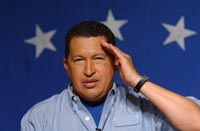Hugo Chavez to nationalize electrical and telecommunication companies
President Hugo Chavez declared he would nationalize electrical and telecommunication companies, taking a bold step toward increasing state control as he promised to transform Venezuela into a socialist country.

Chavez, who will be sworn in Wednesday to a third term that runs until 2013, announced the nationalization plan as a key move in a series of radical changes.
"All of that which was privatized, let it be nationalized," Chavez said, referring to "all of those sectors in an area so important and strategic for all of us as is electricity."
"The nation should recover its ownership of strategic sectors," he said.
The nationalization appeared likely to affect Electricidad de Caracas, owned by Arlington, Virginia-based AES Corp., and C.A. Nacional Telefonos de Venezuela, known as CANTV, the country's largest publicly traded company.
Chavez also said he wanted a constitutional amendment to eliminate the autonomy of the Central Bank and would soon ask the National Assembly, solidly controlled by his allies, to give him greater powers to approve "a set of revolutionary laws" by presidential decree.
"We're moving toward a socialist republic of Venezuela, and that requires a deep reform of our national constitution," Chavez said in the televised address after swearing in a new Cabinet. "We're heading toward socialism, and nothing and no one can prevent it."
Before Chavez was re-elected by a wide margin last month, he promised to take a more radical turn toward socialism. His critics have voiced concern that he would move to consolidate more power in his own hands.
Cuba, which is Chavez's closest ally, nationalized major industries shortly after Fidel Castro came to power in 1959. Bolivia's Evo Morales, another Chavez ally, moved to nationalize key sectors after taking office last year.
Chavez, first elected in 1998, has progressively moved to remake Venezuelan society, rewriting laws, setting up state-funded cooperatives and starting a land reform program that has turned over large swaths of ranch lands to poor farmers. Chavez calls it his Bolivarian Revolution, named after South American independence hero Simon Bolivar.
"The eight-year transition phase is ending and we're entering a new era _ the Simon Bolivar national plan, Bolivarian socialism," Chavez told his audience of cheering supporters.
Chavez cited the communist ideals of Karl Marx and Vladimir Lenin at other points inhis speech, and said: "I'm very much of (Leon) Trotsky's line _ the permanent revolution."
Political analyst Gloria Cuenca said the Monday's announcement was a glimpse of the next six years.
"Chavez is an agitator by trade. He strengthens himself through conflict and as an introduction he gives us this example of how the next six years of his government will be," said Cuenca, a communication professor at Venezuela's Central University. "It seems he has decided to stoke the fire to deepen his revolution, which from my point of view aims to look a lot like Castro's Cuba."
Chavez said that lucrative oil projects in the Orinoco River basin involving foreign oil companies should be under national ownership. He didn't spell out whether that meant a complete nationalization, but said any vestiges of private control over the energy sector should be undone.
"I'm referring to how international companies have control and power over all those processes of improving the heavy crudes of the Orinoco belt - no - that should become the property of the nation," Chavez said.
In the oil sector, it did not appear Chavez was ruling out all private investment. Since last year, his government has sought to form state-controlled "mixed companies" with British Petroleum PLC, Exxon Mobil Corp., Chevron Corp., ConocoPhillips Co., Total SA and Statoil ASA to upgrade heavy crude in the Orinoco. Such joint ventures have already been formed in other parts of the country, the AP reports.
Chavez threatened last August to nationalize CANTV, a Caracas-based former state firm that was privatized in 1991, unless it fully complied with a court ruling and adjusted its pension payments to current minimum-wage levels.
CANTV is the dominant provider of fixed-line telephone service in Venezuela, and also has large shares of the mobile phone and Internet markets.
Electricidad de Caracas is the largest private electricity firm in Venezuela. U.S.-based AES bought a majority stake of Electricidad de Caracas in a hostile takeover in 2000.
After Chavez's announcement, American Depositary Receipts of CANTV immediately plunged 14.2 percent on the New York Stock Exchange to US$16.84 (Ђ12.95) before the exchange halted trading. An NYSE spokesman said it was unknown when trading might resume for CANTV.
CANTV said in a statement that it was aware of Chavez's statements but added that "no government representatives have communicated with the company, and the company has no other information. "
Subscribe to Pravda.Ru Telegram channel, Facebook, RSS!


